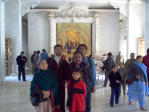Indian government in a hurry
 The United Progressive Alliance of the Congress and its several allies have completed hundred days in office, but still show hardly any sign of self-assurance or stability.
The United Progressive Alliance of the Congress and its several allies have completed hundred days in office, but still show hardly any sign of self-assurance or stability.
The Congress has lived too long outside the corridors of power that it now finds itself uncomfortable in the entirely new situation of sharing power with others. The Left rules the economic domain and the Congress has a sway over the rest of the space. The allies, who are here today and gone tomorrow, are content with tenanting their office chambers in solitary glory. True to earlier forecasts, the Left is extracting an unconscionable price for the support it lends to the Manmohan Singh government, leaving the latter to contend with the contradictions between the pledges the party had made to people and the demands of the Left. The Congress surrendered valuable space to the Left in the matter of reducing government stake in public sector units, permitting foreign capital, and reducing interest rates on provident fund deposits. The unquantified price the treasury will have to pay for this extravaganza will come later. It is still to be seen if the Left will extend its stridency to other areas. Coalitions are an anathema to the Congress but they are the only means for coming back to power. For the present, the alliance seems to be fragile and vulnerable to political power play.
True, Congress chief Sonia Gandhi has shown a lot of judgment in placing a unreserved trust in Manmohan Singh and stayed away from interfering with his administration. However, not being a politician, the Prime Minister is reluctant to assert himself and function like primus inter pares (first among equals). There is a general feeling that most of his ministers still consider Sonia as the boss. Such ministers have created problems that have paralyzed Parliament from day one of its sittings. One very senior minister made derogatory remarks about Rashtriya Swayam Sewak Sangh that has a large following in the country and abroad. Whether he did it on his own or, as some people think, at the behest of Sonia Gandhi, this piece of bravado comes too early in the party’s resurrected life. Another young and brash minister ordered the removal of a memorial plaque dedicated to one of the leading lights of India’s freedom struggle, V.D.Savarkar, from the infamous Andaman cellular jail. But the last straw was the arrest of the chief minister of a major province for what many people regard as a technical offence she is alleged to have committed a decade ago and her incarceration.
Even if we concede that politically it is necessary to check the growing influence of the opposition, the initiative is too premature and untested. In this tug of war, it is the people who are called upon to pay a heavy price. In badly planned reprisals, the opposition stalled the proceedings of Parliament, in a replay of Congress-Left tradition. In this background, the appeal of the Congress to the opposition to co-operate in the conduct of parliamentary business shows that the party had not learnt any lessons from its political exile. The Congress and the left parties regularly disrupted business in Parliament during the Vajpayee regime because they thought that they would never come back to power. But when dame luck smiled on them, they landed themselves in the embarrassing predicament of asking the opposition not to do what they had done when they sat on the opposition benches. Yet, what the opposition did is indefensible because the loss will be that of the people and not the government.
Another poor specimen of statesmanship was the dismissal of some governors appointed by the previous government. Whether such an act was in accordance with the Constitution is not the point. It is whether it was necessary to dismiss governors who really are just innocuous figureheads. The Constitution does not demand anywhere that the nominees should be free of ideology. Since their term is fixed for five years, the nominees cannot be removed unless they are guilty of violating some provision of the Constitution. The governors’ dismissal is the first test for President Abdul Kalam and he played himself into the hands of wily politicians. The President will have to show that he can take independent decisions. Even if he goes with the Congress and the Left it will be prudent for him to avoid the kind of sermons his predecessor delivered in his activist tenure. If governors are dismissed without valid reasons, the government has to defend that act in Parliament and the Supreme Court. Though such actions bring short-term gains they also bring long-term consequences.
Assuming that it is necessary to downsize the influence of the opposition, such an exercise should have been the outcome of planning and inter-party consultation. Just now, it smacks of haste and indiscretion to strike controversial postures when elections are due to take place in Maharashtra and Arunachal Pradesh in October and very soon in Haryana and Bihar followed by West Bengal. Many by-elections are also programmed to synchronize with the state elections. There are complaints from the Maharashtra party that the arrest of Madhya chief minister Uma Bharathi has undermined party prospects in the elections. The Shiv Sena and BJP are bound to rouse passions of the Maharashtrians who hold Savarkar in high esteem.
Supplementing the prime minister’s political inexperience is party chief Sonia Gandhi’s tearing hurry to settle scores mainly with the BJP. People do not believe that an ordinary magistrate has the courage of ordering the arrest of a chief minister of such a big state as Madhya Pradesh and issue a non-bailable warrant nor would they believe that a junior minister could order the removal of the Savarkar plaque without a green signal from the top party brass. Considering two possible consequences, the party needs to contain its exuberance. The first is the excessive reliance on the co-operation of the Left and the second is the unquantified danger of two major parties, the Samajwadi Party and the Bahujan Samaj Party, uniting for the sole purpose of upsetting the UPA apple cart.
Friends of the alliance are disappointed that it has not promptly tackled insurgency in Manipur where an unofficial civil disobedience movement is in full swing. The ugly spectacle of the Punjab chief minister declining to be co-operative in the matter of river waters refuses to disappear. The entire northeast and states bordering Bangladesh are in turmoil. It is not wise to repeal legislation intended to fight such menace in order to spite a previous government. On the other hand, the government is too busy rewriting textbooks and undoing whatever good, bad or indifferent its predecessor had done. What is needed is a positive framework of action and not blind opposition bashing.
Timely advice comes from The Hindu daily, a longtime friend of the Congress. In an editorial it cautions the government, “With another round of elections looming large, inflation has touched a two-year high, a huge cause for worry for a party that has resolved to provide substantial relief to the millions of rural and urban poor. The cycle of debt and death continues in Andhra Pradesh. In Maharashtra, the party is faced with the hard task of meeting the challenge of starvation deaths and containing its political fallout before the elections. In addition, there is the spectre of `tainted Ministers'.”
It was not necessary for the Nehru-Gandhi family to exhibit such unseemly hurry to announce its future heir that it had to convert a party conclave into a competition for sycophants, each hailing Rahul Gandhi (Sonia’s son) much to the embarrassment of incumbent Manmohan Singh. According to a columnist, “One family faithful even conceded that the session had been rendered historic by the participation of the fifth generation Gandhi.” A very senior Congress leader and water resources minister Priyaranjan Dasmunshi said, "The Nehru family is not a family but a movement, a conviction, secularism and sacrifice ... Rahul Gandhi is not dynasty, he is part of the movement." S.Viswam of the Deccan Chronicle wrote, “The most tangible outcome of the proceedings was the informal anointing of Rahul Gandhi as the natural heir and successor of his mother. Indeed, Congressmen seem to be in a tearing hurry to install every available member of the dynasty on the pedestal so that they can continue to revel in adulation and bask under the shine of the Nehru-Gandhi name and fame. It is, however, doubtful if Congressmen do ever ponder over the new situation in which the Prime Minister is forced to play second fiddle to the party president who holds power without either responsibility or accountability.”
Dasu Krishnamoorty
Special for PRAVDA.Ru
Subscribe to Pravda.Ru Telegram channel, Facebook, RSS!





